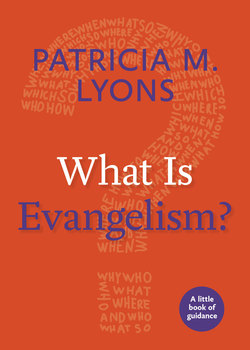Читать книгу What Is Evangelism? - Patricia M. Lyons - Страница 6
На сайте Литреса книга снята с продажи.
ОглавлениеIntroduction: From Burdento Broadcast to Blessing
Evangelism is listening.
This liberating and life-giving fact is contrary to so many of the messages about Christianity going back to at least the fourth century. Roman Emperor Constantine acknowledged the profound proliferation and political power of the followers of Jesus and named Christianity the mandated religion of the Empire. At that time and long after, Christianity was forced upon people by law and by sword. However, sacred and faithful evangelism—contrary to the habits and sins of any Empire—is not primarily an act of speaking or manipulating or even persuading.
Evangelism is first and foremost the ministry of the Holy Spirit in the world. In the beautiful image of creation found in Genesis, the world began with the Holy Spirit breathing and blowing over the whole earth, blessing, sustaining, and transforming chaos into creation, darkness into light, and void into life. Evangelism is what the Holy Spirit is doing, ever arriving as the catalytic and contagious Good News of God’s love. Although all creatures are invited to experience, embrace, and expand the love of God, evangelism is chiefly the holy work of God to make God known throughout all creation. To put it more directly, evangelism is what God does and what God is ever doing at every moment and every place and in every heart. The Holy Spirit is a siren sounding, even now, to find and follow the love of God.
The first step of human evangelism is to listen for the Spirit’s invitation to join God in loving the world and in loving yourself. The Holy Spirit evangelizes us, bringing the Good News of God into our lives. Some people listen to God in silent prayer, asking God to speak. Others listen for God in community or ritual, hearing God in scripture and song. Still others listen for God in human relationships, hearing God’s hope and healing in the wounds or wonders of other people. When we begin to listen for God (and not just talk or sing at God), we experience God’s constant evangelism of everything, drawing all that is toward the new heaven and the new earth. Creation is an act of God’s evangelism.
Today’s Reality
For centuries, Christians have spoken of their burden to convert the world. Although many generations of faithful people wanting holiness have participated in this burden of converting and done so with sincerity and love, I am glad that we in the Episcopal Church have moved away from this paradigm of colonizing the world with Christianity. Though the gospel was often shared and embraced by people who have made Christianity their own, the colonial conversion model has also come with moral disasters, war crimes, and cultural failures. Those who interpreted (and continue to interpret) the Great Commission as permission to subdue the earth with Christianity have driven as many people away from Christ as toward him. The increasing pluralism of America in recent decades has exposed the shallowness and arrogance of this model.
The twentieth century in America brought a crisis of membership in organized religion. And that century continues to leave us in difficult times. It is hard to describe the present and the future of the post-institutional and post-Christian century that we are living. So many institutions in the public square are collapsing. Membership trends for every kind of voluntary association in America are going downward, everything from the Rotary Club to bowling leagues to bingo nights. There appears to be a decline in organized association or religion of any kind.
In fact, statistics1 tell us that the whole globe is experiencing a decline in the participation in any religion at all. At the same time, extremist groups, perhaps fueled by the anxieties and fear that come from this global decline of religion, have taken up vitriol and violence against neighbors or migrants, making it even harder for people who are not religious to take the whole enterprise of organized religion seriously or even morally compelling.
And so we have extremes, and with a shrinking moderate and faithful center. Membership in mainline Christianity in America is falling off the cliff, for both Protestant and Catholic communities. There seems to be no version of Christianity in America that is not experiencing a period of decline.2
Beginning in the 1960s, today we continue to depend on a broadcasting mode. Television, print media, internet . . . these have all been places where people are posting and pushing their versions of truth. But it isn’t working. The extremists are broadcasting too. In a post-modern mindset and culture, moderates are not entirely sure what they believe about Jesus and so, at best, they broadcast welcome and inclusion but do not match the depth of their openness with deep teaching or deep practice. We moved from the burden of converting the world to broadcasting to the world.
The good news is that there is a discernable new movement of the Holy Spirit in our times. I believe we are being called to sharing our faith not as burden or broadcast but instead as blessing.
The Holy Spirit, who is both God and evangelist for God in the world, is at work everywhere to heal, liberate, and redeem. Every form of death died in the tomb, and resurrection is the first fact and act of the new heaven and the new earth. This is the message that God is spreading. Every one of us is invited to join God’s mission. It is time to learn to bless the world with the gospel, not conquer it or rule it. The title of every person who says yes to this invitation to bless the world with love is evangelist.
